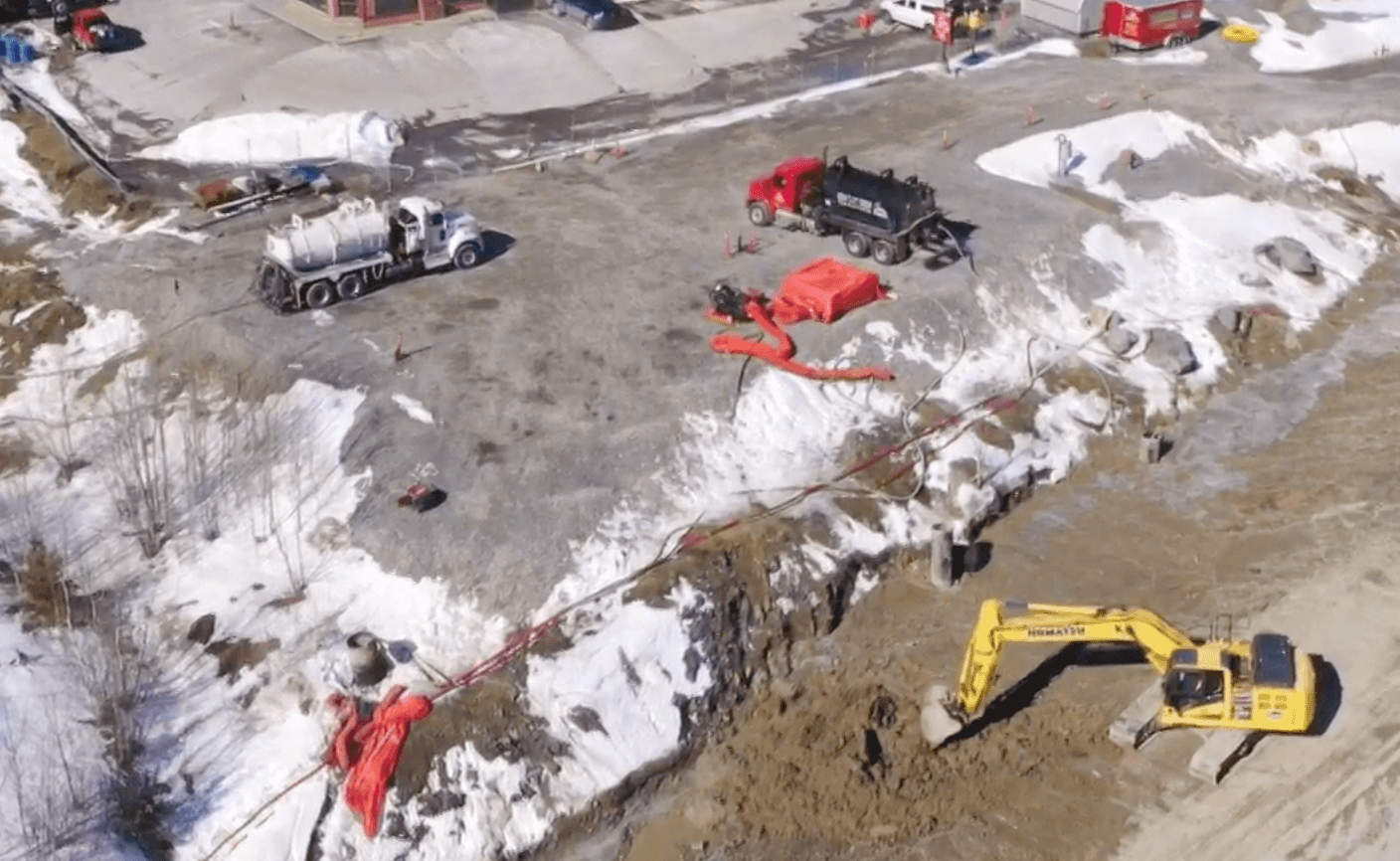Company releases few new details; government plans provincewide checks of retail gas outlets in response to 100,000-plus litre fuel leak in Woodstock
Irving Oil has broken its silence about the more than 100,000-litre diesel fuel leak in Woodstock.
The diesel fuel spill at the Beardsley Road Irving was discovered in December. An investigation found that the fuel release was caused by a crack in a remote fill elbow, which has since been decommissioned.
“The systems and processes in place to protect against and prevent this unfortunate incident did not operate as intended,” the April 7 news release from J.D. Irving noted. “We have undertaken a thorough and extensive review of this matter to prevent further occurrences.”
The full scope of the spill, initially detected on Dec. 12, only became evident in late February, when CBC unveiled information garnered through a freedom of information request from the New Brunswick environment department.
Emails and reports from government officials and others gathered through the CBC’s fact-finding search indicate as much as 100,000 litres of diesel escaped from the storage tank into the surrounding environment.
Documentation gathered by CBC shows that the fuel leak issue was first brought to the attention of the Department of Environment and Local Government following a report from the Tim Horton’s franchise, which sits in the parking lot of Murray’s Irving Restaurant and Truck Stop on Beardsley Road in Woodstock.
After customers and staff raised concerns about the petroleum odour in the restaurant’s bathroom water, Tim Hortons contracted Gemtech to test its treated and untreated water.
On Dec. 12, the company collected samples, confirming the testing results on Dec. 14,
“They have received the results today and confirmed the presence of gasoline in the untreated water,” the Department of Environment environmental inspector stated in a Dec. 14 memo.
The discovery kicked off a massive undertaking to determine the spill’s source, amount, cleanup, and mitigation. Officials quickly discovered that a fuel leak had already contaminated the Tim Horton’s well and the well serving Murray’s restaurant and Irving truck stop.
The businesses immediately closed their doors, and environment officials, Irving staff, and numerous consultants and contractors poured into the location to address the matter.
Meanwhile, the documentation secured by the CBC information request demonstrated growing concerns among environmental officials.
With the Irving underground fuel tanks pinpointed as the source of the contamination, the company immediately hired Dillon Consultants to identify the problem and develop a mitigation strategy.
The investigation soon discovered that what Prosser initially estimated (a potential 5,000-litre leak) appeared exponentially larger, possibly surpassing 100,000 litres. In addition to breaching the nearby wells, the free-flowing fuel put surrounding wells at risk. It infiltrated the groundwater and flowed overground downhill towards the nearby Trans Canada Highway.
Environmental inspector documents indicate that surface water in the nearby highway ditches contained 90 per cent fuel.
Tim Hortons immediately closed its business following the discovery and remains closed almost three months later. Meanwhile, Murray’s Restaurant and the Irving gas bar reopened after a few days, using potable water trucked into the businesses.
The size of the spill shocked many, including environmental officials. Investigators identified the cause of the leak as a cracked elbow attached to one of the Irving underground tanks.
Despite identifying the apparent cause of the leak, investigators noted in their reports and emails that they couldn’t determine whether the diesel leaked slowly over a long period of time or flowed quickly into the surrounding ground.
“Investigation is ongoing as to why the release didn’t trigger any sort of alarm, and there may be no way to know if it was a small leak over a few months or something larger with a shorter time frame, explained Mallory Gilliss, a manager of contaminated sites with the Department of Environment, in a report issued on Dec. 23.
Many people familiar with the intense record-keeping and safety protocols surrounding fuel tanks are bewildered by how that much fuel could leak undetected.
“It’s mind-boggling,” said an operator familiar with fuel storage.
He and other operators explained that service stations or anyone operating fuel depots must maintain precise records showing the amount of fuel flowing in and out of the tanks.
Operators must do daily reconciliations and be prepared for audits at any time.
In a news release issued by the province on April 8, Environment and Climate Change Minister Gilles LaPage announced that his government would inspect gas stations across New Brunswick.
“In the wake of receiving further information last week from Irving Oil Ltd. on the circumstances of the spill, the department is conducting a provincewide inspection of retail outlets to confirm regulatory compliance and to ensure that site owners have proper measures in place for detecting and managing petroleum product spills,” the release states.
Remedial work continues around the clock at the site to contain and clean up the affected area. The province says results to date show no impacts on off-site potable wells or the nearby wetland.
Provincial officials with Environment and Climate Change meet regularly with Irving Oil Ltd. and its consultants. The department said it has responded to concerns from the Wolastoqey Nation in New Brunswick, the mayor of Woodstock, the local MLA and members of the public.
The department has taken the following actions:
· Identified Irving Oil Ltd. as the responsible party.
· Required Irving Oil Ltd. to immediately hire a site professional to oversee emergency response and cleanup.
It will also:
· Continue to investigate the incident to determine if there were any violations of environmental legislation.
· Ensure Irving Oil Ltd. continues to comply with environmental legislation, including petroleum handling and storage regulations.
· Ensure site professional assessment activity is in accordance with the department’s contaminated sites regulations.
“I understand the community’s concerns, and as the investigation progresses, I will continue to provide regular updates,” said Minister LaPage.
- with files from Jim Dumville















